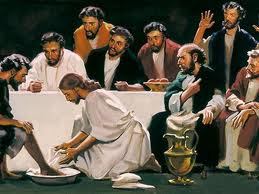
Once while visiting the University of Kentucky, we ran into an assistant to the famous basketball coach, Tubby Smith. In talking about the coach, the assistant said to us, “Tubby never forgot where he came from.” What a compliment! This man, though in the public spotlight, remembered his roots and did not let fame go to his head.
Would that our first parents remembered “where they came from.” It was the lure of leaving who they were and moving up to God’s position, that was the beginning of their downfall. The story of the human race is man’s quest to re-discover “where he came from,” and to reestablish his identity as a child of God.
Today Jesus speaks to his Apostles—the select few who were to be the leaders of the Church. Knowing the temptation for religious leaders to see themselves as superior to others, he warned them not to fall into this trap. He spoke a parable (Luke 17:7-10).
“Who among you would say to your servant who has just come in from plowing or tending sheep in the field, ‘Come here immediately and take your place at table’? Would he not rather say to him, ‘Prepare something for me to eat. Put on your apron and wait on me while I eat and drink. You may eat and drink when I am finished.’”
This is common sense. When a servant finishes one task, he does not expect his master to trade places with him. Instead he begins his next task—in this case preparing dinner for his master. A faithful servant, in time, will be given opportunity to eat his own dinner.
“So should it be with you. When you have done all you have been commanded, say, ‘We are unprofitable servants; we have done what we were obliged to do.’”
Apostles were never to lose sight of who they were—servants of Jesus. When they finished a work, no matter how exalted it might be, it was not time for them to sit back and let others serve them, as though they were the Master. Instead, they were to continue doing servant work, which might be washing dishes or sweeping the floor. They were to consider themselves to be “unprofitable servants” who just did what the Master expected of them.
This leadership role stood out in contrast to that of the religious leaders of Jesus’ day, who “profited” from their learning and position, by rising to a higher place in the system, sometimes at the expense of the poor.
It is told of St. Francis of Assisi that after preaching a heart-moving sermon in which whole congregations fell to their knees in repentance, someone came up to him and praised him for his work. Francis told the person, “If you want to praise someone, go out to the front steps and praise the poor brother who has been praying for me while I preached. Without the power of his prayer, my preaching would have been just empty words.”
Not only Church leaders, but all of us, must remember who we are—unprofitable servants. If we are honored, fine; if not, fine. No matter what work we do, we are still servants of the same Master. A Pope who delivers a moving sermon is no better than the minimum-wage custodian who sweeps the kitchen floor. We are all fellow servants of Jesus Christ. And after we’ve done all our work, Jesus will sit us down at table in the heavenly banquet table and wait on us.
“Whoever loves me will keep my word” (John 14:23).
